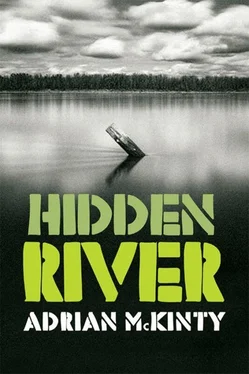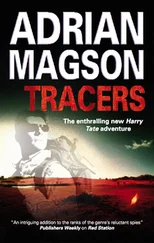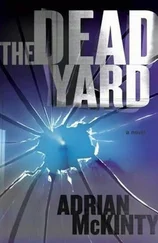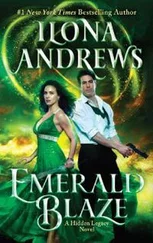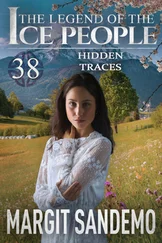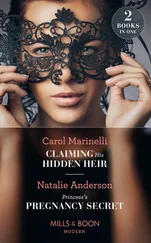“She showed us the one above,” I said.
“Alex, come on, don’t deny the significance of it.”
“John, you’re crazy if you think I’m walking into the lion’s den, just because of some stupid ad,” I insisted.
“Alex, it’s a job, we have no money for food, or, I might add, ketch. No one knows that we saw Klimmer, he said so himself. We wouldn’t be walking into the lion’s anything. The cops are looking for Hispanic guys in his death. There is no one to connect us to that at all. And once we’re back on the case, you could legitimately ask Mr. Patawasti for money again. Don’t you see, this is our way out.”
“Your way out of guilt,” I said, and wished I hadn’t.
“No, your way out of not starving and not going back to Ireland to a bullet in the brain. I’m going to see what it’s all about, you can come or not, up to you….”
* * *
I am seven feet away from Victoria Patawasti’s murderer. Here in this room. If Klimmer was right, one of those two men a mere three weeks ago took a.22-caliber revolver and shot Victoria in the head.
Charles Mulholland, Robert Mulholland.
But also sitting at the desk in front of me, Mrs. Amber Mulholland (Charles’s wife) and Steve West (vice president and personnel manager). The room: white carpet, nature scenes on the wall, a large plate-glass window that looked out on Barnes & Noble, McDonald’s, and the Rocky Mountains stretching fifty miles north and south in a huge panorama that took the breath away.
And something else that took the breath away.
Klimmer had been right about Amber Mulholland. You’d have to be crazy not to want to be with her.
How could you focus on Charles or Robert, trying to figure which one was the killer, when she was there?
Amber, tall, overwhelming, a blond, more than that, an iconic blond. A strikingly beautiful American woman of the type that I didn’t think they made anymore. Something old-fashioned about her. Sophisticated, clever. Hair falling in a cascade down her elegant back. A white blouse, pearl necklace, icy blue eyes, skin like porcelain, no, marble, no, vellum — soft, rich, extraordinary, in fact. Cheekbones like knife blades. Liz Taylor’s eyes. Audrey Hepburn’s neck. And no, again, forget comparisons. If the Führer had had his way all women would look like this. Radiant, regal, poised, strong.
She didn’t look fake like Miss America. Miss America would be the girl doing Amber’s nails. She was the real deal. You couldn’t overwrite her. She had star quality. Grace Kelly rather than Madonna. Hitchcock rather than Chandler.
Adroit, assured, and with the sort of sneering sangfroid that made you want to give her a three-picture deal, made you want to sell your family into a silver mine to spend the night with her. And something menacing about her too. This is the sort of woman who never had to lift a heavy box in her life. This is the sort of woman who could start a war between Greeks and Trojans.
I learned later that she was about thirty years old, originally from Tennessee but, fortunately, she didn’t have a Southern accent. That would have been the clincher. If she’d said “Free the South from the Yankees,” you would have been out looking for guns and horses.
And as Charles is talking and I’m standing there looking at her and not looking at her, two thoughts occur to me: she’s thin enough and beautiful enough to be a model or an actress or a person in her own right, not just Mrs. Amber Mulholland, and, second and more weirdly, she’s the inverse of Victoria Patawasti. In mathematics it is called the reciprocal. Victoria, bronzed and brown-eyed and heavy-lidded and dark-haired and beautiful. Amber, golden-haired and azure-eyed and pale-skinned and athletic and beautiful.
And maybe there was a sexual motive, after all. Maybe Charles was having an affair with Amber’s dimensional opposite.
Maybe.
Maybe it was too much to be with her.
You can only stare so long at the sun….
But anyway, the here and now.
The office, the mountains.
Charles himself. Thirty-eight, tall, clean-shaven, handsome, cool, hair in a blond wave, breaking extravagantly to the left of a large intelligent face. Gray eyes with a slightly surprised expression on pale cheeks. Linen jacket, open-necked white shirt, fluttering hands, charming, just the type who could kill someone and be blasé about it in front of the missus or the cops.
Robert Mulholland, the younger brother by five years, another blond. It’s like the Village of the bloody Damned in here. The same wave breaking on a barer beach, paradoxically, although younger, he’s losing his hair, but he’s still lean, handsome, pale, with glasses, taller even than his brother, more of a William Hurt look about him, black T-shirt, distracted, bored. Smarter? More cold-blooded? Fingers folded in front of him on the oak desk. Steady hand on a pistol grip.
Both brothers nice, friendly, inviting. You didn’t need Hannah Arendt to talk about the banality of evil, experience has taught me that either of them could be the killer.
I can’t help wishing I had John around.
Is John here to support me? No, he’s not. John lied. For when he’d convinced me to go to CAW and made me see the sense of it, he said that it was better I go alone, too suspicious, the pair of us, two Micks, showing up.
He was right, but even so.
I had made it through the first stage, an interview with a man called Abe, and now this was the final process.
The fourth person at the table, Steve West, a goateed, squat man, is doing most of the talking now. I don’t like him, he has his hat on indoors, and people like that can’t be trusted:
“Well, uh, Mr. O’Neill,” he continues, looking at my J-1 visa (from Pat’s mate, a proficient little forger who mostly worked with the large Mexican and Central American communities but for only another hundred dollars rustled up an Irish passport), “Abe has passed you on to us, so you must be the sort we’re looking for, let me, uh, let me explain a little about the position. At this stage we’re looking for another dozen campaigners, to increase name recognition and membership of CAW. It’s important, especially now we’ve moved to Denver, that we increase membership. Membership is important for revenue and for political clout. The more members we have, the more influence we can muster and the more members we’ll get.”
“I see,” I say. “And how many members do you have at the moment?”
“Eight thousand five hundred, or thereabouts, five thousand of whom are in Colorado. I know, it’s a drop in the ocean compared to Greenpeace or the Sierra Club or Audubon, but we’re a very young organization and now we’ve relocated to Denver, we’re hoping to grow exponentially. We do have branches in Fort Collins and Colorado Springs, but also Sante Fe, Phoenix, Salt Lake City, and Los Angeles,” Steve says.
“How young an organization are you?” I ask.
“Three years old, but it’s only really in the last six months that we’ve really begun to get things together. I’ve taken a leave of absence from my law firm and now that we’ve moved here to bigger offices, we’re hoping we can really grow,” Charles answers with a winning smile.
“You’re from Ireland?” Mrs. Mulholland says, surprised, suddenly looking up from my entirely fictional CV. I have to not look at her to answer.
“Yes,” I say.
She passes the CV to Charles.
“And you’re here on a J-1 visa?” she asks.
“That’s right,” I say, “I’m going to be attending Red Rocks Community College for a year, doing their Celtic Studies diploma, and then I’m going back to the University of Ulster.”
Charles and Mrs. Mulholland look at each other. Robert picks up the photocopy of the résumé and takes his glasses off to examine it.
Читать дальше
